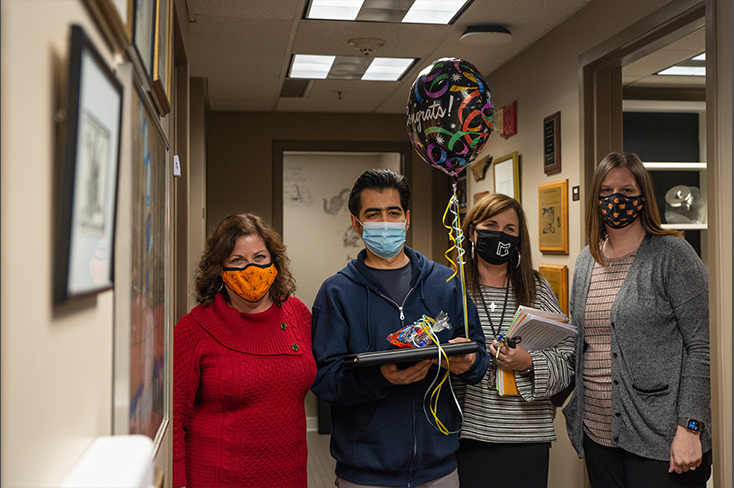Family Everywhere: Graduate Student Employee of the Year Makes Connections
Commitment.
Commitment to studying. Commitment to attending class. Commitment to projects, papers, and presentations.
It’s a word that all University of Findlay students know well, as the strength of it can often determine the fate of an academic career. For some UF students like Mahdi Khansari, who was recently named the University of Findlay Graduate Student Employee of the Year for his work with UF’s Mazza Museum, it leads to recognition for their dedication to commitments outside of the classroom.
Khansari comes to UF by way of his home country of Iran, where he earned an undergraduate degree in engineering from University of Kashan in 2010. He wanted to “add skills” to that degree, he said, and that started him on his quest to find a university at which he could continue his education. He did some research in that way, eventually landing on UF, and arrived in Findlay for the start of the 2020 spring semester with excitement and a bit of trepidation. He had tried to get a visa for his family – Khansari has a wife and a young son – but wasn’t able to do so in time for him to get to the U.S. He figured that they would follow behind with little fanfare relatively soon after. The problem, however, was that in February of that year, the COVID pandemic created obstacles in nearly every way imaginable, including international travel. Khansari found that he would have to go it alone for the initial part of his UF journey. He soon discovered, however, thanks to the kindness of OilerNation and the Findlay community, that it wouldn’t be as difficult as one would first think.
Wanting to earn an income to supplement his studies toward a master’s degree in applied security and analytics at UF, Khansari began pursuing student employment on campus, and it was through his work in this capacity that he discovered the kindness and camaraderie that helped him when he was missing his family back in Iran. He worked first for UFTV until the pandemic whittled down the need for assistance with video production, similarly drawing down the hours that he was needed for work. Subsequently, Khansari moved on to work for the physical plant as a groundskeeper. “Thankfully, COVID didn’t have much of an effect on the need for assistance with keeping up campus,” he said. “There was lots of work to do there.” His success with the job led him to doing even more with the plant, turning to opportunities for maintenance, small electrical and carpentry jobs, and even fixing furniture in need of repair. Along with building furniture, he was building relationships that were not only necessary to help him feel a sense of belonging, but that were also instrumental in assisting him when other opportunities came knocking. “I worked with and met some of the nicest people during that physical plant job,” he said. “And they even wrote me a letter of recommendation for this one.”
The “this one” to which Khansari is referring is his current job as a graduate assistant with UF’s Mazza Museum, the one for which he was nominated and ultimately named Graduate Student Employee of the Year. Khansari was nominated by Karen George, senior director of advancement for UF, because, she said, of his wide range of contributions to the Museum. “Mahdi puts everyone at ease and is able to produce the results he wants whether he’s taping virtual content or sharing his ideas and expertise. He is a true member of our team,” George said.
Khansari moved to the job at Mazza due to the opportunity to receive credit hours of tuition remission as an official graduate assistant. During this period of working for Mazza, he realized quickly that the kindness he’d seen across campus, from classes to social events and through his employment with UF, is magnified even that much more within the walls of the Museum and by those with whom he currently works. “I’ve truly enjoyed all of my jobs at UF,” he said, “and everyone is so kind. [At Mazza], I’d say they’re like my family. They really are. I have an engineering mind, and not really a creative one, so they’re teaching me a lot in that way and I’m learning so much.” With his engineering abilities, Khansari said, he’s excited about the Joseph and Judith Conda STEAM Education Center and what he might be able to offer toward that up-and-coming high-tech facility. “I think I can provide a lot of specific help for them [toward] that,” he said. George agreed, saying that Khansari “possesses a winning personality and game-changing technical knowledge that will impact [the STEAM Center].”
The endeavors that Khansari commits to run deep; among others, he volunteers at the City Mission in Findlay, and is now doing voluntary energy management software for the UF physical plant, partly because of the close relationship he developed with the people there. “I’m doing it voluntarily because this is a time I can help the people over there who were so good to me,” he said. “In a couple months, you’ll see my work on the software dashboards that we named ‘Oiler Energy Management (OEM)’ and that track the energy consumption of certain areas on campus. It’ll be great and it will benefit the University a lot, I think.” The idea of paying back the good deeds and helpful assistance he has received in his short time here is one that Khansari always keeps at the front of his mind, and that alone, it seems, is as beneficial for both him and UF as anything else.
As Khansari and UF continue to mutually help one another, his life is beginning to take clearer shape. His wife and son are now here in the U.S. with him, so Khansari’s worries about his family have been relieved a bit. On a path to graduate in December of this year, Khansari and his positive spirit have been lifted further by the Employee of the Year honor. Coming quite a way both literally and figuratively in a little more than a year, he knows that he’ll make even greater progress as time goes by; and when he does, he said, he plans to pay it forward even more. “People are just really cool in Findlay and at UF,” he explained. “Especially with international people. When I was here and I didn’t have my family, the people from Mazza and campus acted just like family. I’ll be coming back here after I graduate to help out in whatever ways I can. For now, though, I’ll just say ‘Thank you.’”

